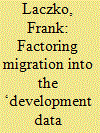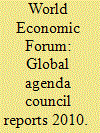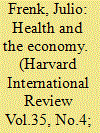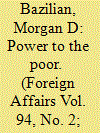|
|
|
Sort Order |
|
|
|
Items / Page
|
|
|
|
|
|
|
| Srl | Item |
| 1 |
ID:
131995


|
|
|
|
|
| Publication |
2014.
|
| Summary/Abstract |
Within the scholarly debate on the current power transition in the international system, particular importance is attached to China's economic rise and the global shifts it is bringing forth in material primacy. A thorough understanding of these shifts in the relative distribution of power, however, requires leaving the narrow path of material capabilities and looking at normative accounts as well. Taking up this challenge, the article focuses on the political dimension of China's rise by exploring the country's alignment with South American governments along two dimensions: the convergence of their foreign policy ideas and the provision of diplomatic links facilitating their cooperation and coordination in global politics. The empirical analysis depicts a nascent global agenda forming between China and certain South American countries and shows that, along with growing levels of foreign policy compatibility, China has also advanced its diplomatic inroads into the region, particularly at the level of bilateral relations. Taking these developments as a whole, it is suggested that China has gained international attraction in terms of its visions of global order and as a potential political partner throughout the region. The article concludes with a discussion of the findings in light of the ongoing relative shifts in the distribution of global power beyond material primacy, and the prospects for China's further political rise.
|
|
|
|
|
|
|
|
|
|
|
|
|
|
|
|
| 2 |
ID:
131511


|
|
|
|
|
| Publication |
2014.
|
| Summary/Abstract |
Through a series of focus groups with human security practitioners, we examined how powerful organizations at the center of advocacy networks select issues for attention. Participants emphasized five sets of factors: entrepreneur attributes, adopter attributes, the broader political context, issue attributes, and intranetwork relations. However, the last two were much more consistently invoked by practitioners in their evaluations of specific candidate issues. Scholars of global agenda setting should pay particular attention to how intranetwork relations structure gatekeeper preferences within transnational advocacy spaces because these help constitute perceptions of issues' and actors' attributes in networks.
|
|
|
|
|
|
|
|
|
|
|
|
|
|
|
|
| 3 |
ID:
138407


|
|
|
|
|
| Summary/Abstract |
Migration stories appear in the news around the world nearly every day. Migration is one of the most hotly debated policy issues and has grown in importance on the global agenda of the United Nations (UN). But how much do we really know about migration and the impact of migration policies and programs? Do we have the data to make a strong case for the inclusion of migration in the post-2015 development agenda? This article takes a hard look at the migration evidence base and outlines a set of recommendations to achieve a “migration data revolution” over the next decade. The article is written from a global perspective, and discusses data on both regular and irregular migration. It also considers how data are shared and used by policymakers, and why there is so little data on the impact of migration programs.
|
|
|
|
|
|
|
|
|
|
|
|
|
|
|
|
| 4 |
ID:
103833


|
|
|
|
|
| Publication |
Geneva, World Economic Forum, 2010.
|
| Description |
358p.
|
|
|
|
|
|
|
|
|
|
|
|
Copies: C:1/I:0,R:0,Q:0
Circulation
| Accession# | Call# | Current Location | Status | Policy | Location |
| 055930 | 341.2322/WOR 055930 | Main | On Shelf | General | |
|
|
|
|
| 5 |
ID:
132545


|
|
|
|
|
| Publication |
2014.
|
| Summary/Abstract |
W e are at a critical juncture in efforts to promote development around the world. If we are to meet the challenges of our times we need new forms of thinking and acting. The key to deal with a changing and increasingly complex reality is integration, and the starting point for integration is the acknowledgment of the crucial notion that social and economic policy are really two sides of the same coin. The recent evolution of global health epitomizes this idea. Indeed, many observers have remarked that the past decade can be seen as a new era in global health. The most important feature of this is the fact that health matters have stopped being the exclusive concern of domain experts. Instead, health has come to occupy a central place in the most pressing dimensions of the global agenda: economic development, national security, democratic governance, and human rights. In this context
|
|
|
|
|
|
|
|
|
|
|
|
|
|
|
|
| 6 |
ID:
137589


|
|
|
|
|
| Summary/Abstract |
Imagine life without electricity. With no lights, electric stove, or water pump, you must travel miles to fetch water and firewood, running a particular risk of attack if you are a girl or a woman. At home, you cook over a smoky stove or an open fire, raising your odds of getting lung and heart disease. If you are pregnant, you may die in the dark, giving birth at a clinic that lacks air conditioning and modern medical equipment. Without vaccines, which require refrigeration, your children remain vulnerable to deadly diseases. At night, they study by the light of a kerosene lamp, which causes burns when the fuel spills. Earning a living isn’t easy, either. No electricity means no sewing machines or rice mills, no pumps for irrigating crops, and no way to keep drinks cold or keep a store open at night. The lack of power keeps away bigger companies that might have hired you.
|
|
|
|
|
|
|
|
|
|
|
|
|
|
|
|
|
|
|
|
|